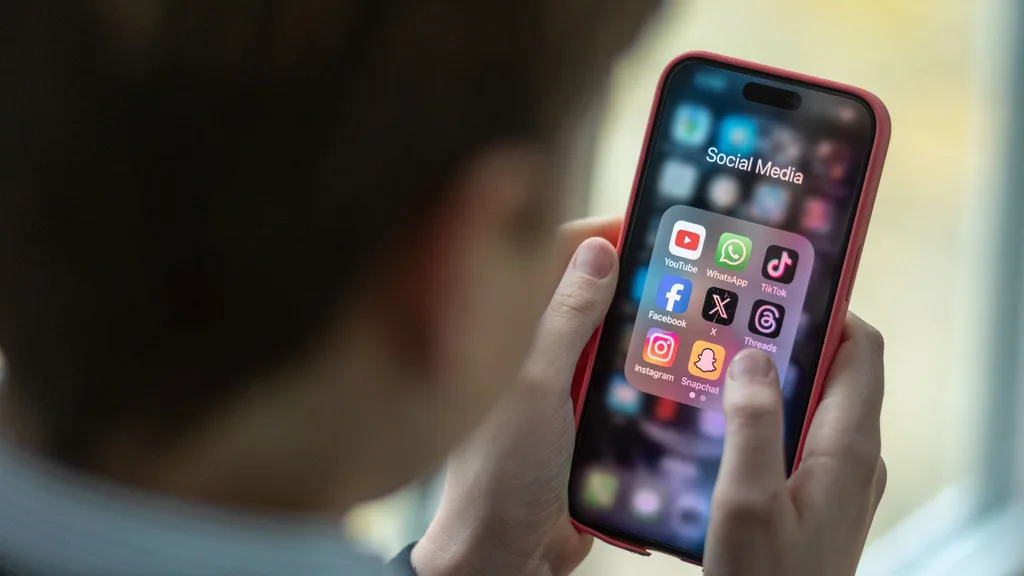Prime Minister Anthony Albanese’s proposed ban on social media for children and teens under the age of 16 has officially been passed in the senate.
When the announcement was first made by Prime Minister back in September, he had promised to introduce legislation forcing social media companies to enforce a minimum age limit, into parliament before the end of the sitting year, and in the eleventh hour, he did just that.
Despite calls for the bill to delayed until the new parliamentary year to give the Senate time to properly debate what many considered a rushed and flawed law, the major parties moved swiftly to ensure the legislation made it through unobstructed.
Tech companies had also called for the delay until the government’s age-verification trial had been finalised.
When introducing the bill, communications minister Michelle Rowland said that social media could be “a source of entertainment, education and connection with the world and each other.”
“But for too many young Australians, social media can be harmful. Almost two-thirds of 14- to 17-year-old Australians have viewed extremely harmful content online, including drug abuse, suicide or self-harm, as well as violent material,” she continued.
In a press conference earlier in the year, the Prime Minister said: “Social media is doing harm to our kids, and I’m calling time on it.”
“I’ve spoken to thousands of parents, grandparents, aunties and uncles. They, like me, are worried sick about the safety of our kids online, and I want Australian parents and families to know that the government has your back.
Albanese explained that it will be a coordinated effort at a national level, rather than a state level. “We want to make sure there’s a national response rather than eight different states’ responses,” he said.
He went on: “Parents are worried sick about this… We know they’re working without a map. No generation has faced this challenge before. The safety and mental and physical health of our young people is paramount. Parents want their kids off their phones and on the footy field. So do I.”
In passing the final legislation, the government included additional amendments to its original proposal which included data restrictions being placed on the included tech companies.
For example, the tech platforms will not be able to collect government-issued identification such as drivers licenses or passports as the primary means of age confirmation. They will, however, be able to request and collect such identification “if other alternative age assurance methods have been provided to users.”
An “independent review” process, to be enacted after the first two years, was also written into the amendment to ensure privacy protections and more are being adhered to.
It’s still unclear as to how the rules and world-first laws will be enforced, but with the deadline
Which Platforms Will Be Included?
The bill has introduced a new term titled “age-restricted social media platforms” into the Online Safety Act.
Targeted platforms include TikTok, Facebook, Snapchat, Instagram and X, as well as forum and message board Reddit.
The laws will not apply to messaging services such as WhatsApp or Facebook Messenger – or important services like Kids Helpline.
How Will The Australian Government Enforce A Minimum Age Limit?
The answer to this question isn’t a simple one – we don’t know right now.
As Albanese even admitted that the technology to enforce a minimum age limit is still in development. Specifically, the federal government has been trialling methods for age verification. The most recent phase applies to preventing children from accessing porn sites and teenagers aged 13 to 16 from accessing social media sites.
“What we’re looking at is how you deliver it,” Albanese previously told ABC News Breakfast in an interview. “We know that it’s not simple and it’s not easy. Otherwise, governments would have responded before.”
The onus to enforce the age limit will fall to social media companies, with Albanese saying during the press conference that he expects social media companies to “demonstrate they are taking reasonable steps to prevent access.”

On Thursday, a spokesperson for Meta said that the company would comply with legislation if requires, but questioned the ability for current technology to make it possible.
“The idea that somehow you can sort of force the industry to be in a technological place that it isn’t, is probably a bit misunderstood in terms of where the industry is,” said Meta’s global head of safety, Antigone Davis.
New fines of up to $50m would apply to tech companies with “systematic” issues, or rather, where getting around restrictions is considered easy.
The details around enforcement in the bill itself have been left intentionally vague, with regards to how it will be achieved.
“The Bill does not dictate how platforms must comply with the minimum age obligation,” the memorandum states.
“However, it is expected that, at a minimum, the obligation will require platforms to implement some form of age assurance, as a means of identifying whether a prospective or existing account holder is an Australian child under the age of 16 years.”
Rowland admitted she didn’t expect the plan to be “met with universal acceptance” but that governments should be taking steps towards a solution one way or the other.
“There is wide acknowledgement that something must be done in the immediate term to help prevent young teens and children from being exposed to streams of content, unfiltered and infinite,” she said.
What Was The Previous Age Restriction On Social Media?
Prior to the announcement, there was no government-enforced minimum age limit for social media users, though most platforms do state that users must be 13 years old or above to sign up for an account. This is reportedly based on the Children’s Online Privacy Protection Act (COPPA) in the United States, which governs the online collection of personal information from children under 13.
This age limit also applied in Australia, but there had been a bigger push this year for the Australian Government to increase the age limit and enforce it through fines for social media companies that fail to comply. In Australia, the loudest organisation to push for the age change comes courtesy of ‘36 Months’.
Co-founded by radio host Michael ‘Wippa’ Wipfli and the founder of film production company FINCH, Rob Galluzzo, 36 Months refers to the three years between the current social media age limit and the proposed age limit of 16.
‘We’re raising an anxious generation,” reads the 36 Months mission statement. “Excessive social media use is rewiring young brains within a critical window of psychological development, causing an epidemic of mental illness.”
The platform aims to create a supportive space for teenagers to foster resilience, mindfulness and a strong sense of identity. It’s also spearheading a petition to “raise the age for social media citizenship”, which currently has more than 116K signatures.
Who Supports The Minimum Age Increase?
The age increase has bipartisan support at a national level. Earlier this year, Opposition Leader Peter Dutton announced that the Coalition would pursue a social media ban for children under 16 years of age.
In May, Albanese backed the campaign, though it’s worth noting that The Greens have opposed a blanket ban, saying that it would harm education.
The reception from experts in the field has been mixed, and this is largely down to privacy and data collection. Any age verification system would require a level of data collection from social media companies, and as such, questions have been raised about whether we want companies to have such detailed information about Australian citizens.
Concerns were also raised about the short consultation period, after the period between introducing the bill to parliament (last Thursday) and it being tabled in (this Tuesday) gave little time for robust submissions or inquiry.
“Legislation is a necessary tool, but it is not a panacea,” said Labor senator Karen Grogan.
“Young people, and in particular diverse cohorts, must be at the centre of the conversation as an age restriction is implemented to ensure there are constructive pathways for connection.”
READ NEXT: ‘I Dread The Day My Kids Are On Social Media’
This article originally appeared on Marie Claire Australia and is republished here with permission.







